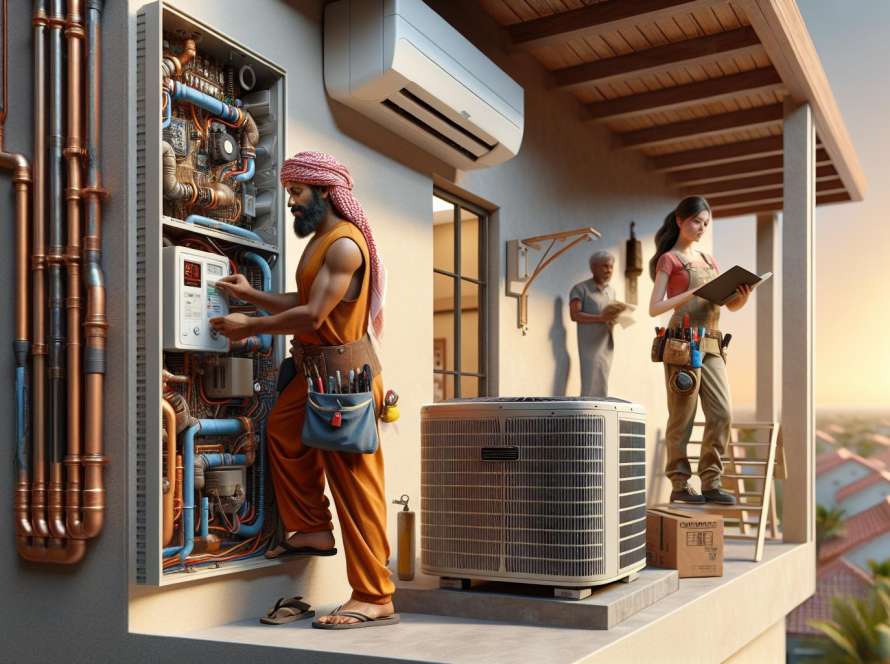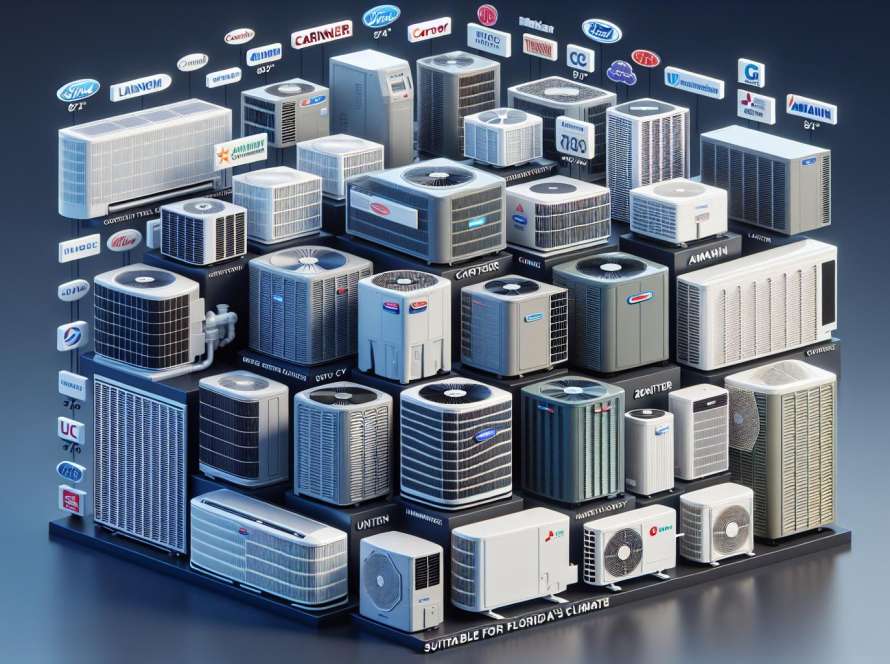So, you’re looking to keep your AC running smoothly in a salty climate. We get it – the struggle is real. Salt in the air can wreak havoc on your air conditioning system, leading to corrosion and reduced efficiency. But fear not, we’ve got the inside scoop on how to optimize AC maintenance in salty climates.
When it comes to combating the effects of salt on your AC, proactive measures are key. From regular cleaning to protective coatings, there are several steps we can take to ensure your system stays in top shape. Our expert tips will help you navigate the challenges of salty air and keep your AC humming all year round.
Don’t let salt air get the best of your air conditioning unit. With our proven maintenance strategies, you can protect your investment and enjoy cool, comfortable air no matter the climate. Let’s dive into the world of optimal AC maintenance in salty climates and keep your system performing at its best.
Understanding the Impact of Salt on AC Systems
Salt in the air can significantly affect the performance and lifespan of your air conditioning (AC) system. Here’s how it impacts AC systems and what you can do about it:
For Beginners: Basics of Salt Corrosion
- Salt in the air mixes with moisture and forms corrosive compounds that can damage AC components.
- Corrosion can lead to leaks, decreased efficiency, and system breakdowns.
For Intermediate Users: Identifying Signs of Salt Damage
- Look out for rust or corrosion on metal parts of your AC unit.
- Keep an eye on reduced cooling capacity or higher energy bills, which could indicate salt damage.
- Regularly clean and rinse the AC system to remove salt residue.
- Apply protective coatings to vulnerable components to prevent corrosion.
We must stay proactive in combating the impact of salt on our AC systems to ensure they operate efficiently and have a longer lifespan.
Importance of Regular Cleaning and Inspection

In salty climates, AC maintenance goes beyond the basics to combat the corrosive effects of salt in the air. Regular cleaning and inspection play a crucial role in preserving the efficiency and longevity of your system. Here’s how you can stay ahead at every expertise level:
For Beginners: Mastering the Basics:
- Frequent cleaning: Start by removing debris and dirt from the unit regularly.
- Visual inspection: Look out for visible signs of corrosion, such as rust on metal components.
- Filter checks: Ensure filters are clean and replace them as needed to maintain proper airflow.
For Intermediate Users: Enhancing Your Maintenance Routine
- Professional servicing: Consider annual maintenance checks by an HVAC technician to deep clean and inspect your system thoroughly.
- Coil cleaning: Focus on evaporator and condenser coils as they are susceptible to salt buildup.
- Protective coatings: Apply anti-corrosion coatings to metal parts to create a barrier against salt exposure.
- Corrosion-resistant materials: Invest in AC units made of rust-resistant materials for increased durability.
- Humidity control: Implement humidity control measures to reduce the impact of moisture in the air on your system.
- Monitoring systems: Utilize smart technology to track and analyze the performance of your AC system, enabling early detection of potential issues.
By prioritizing regular cleaning and thorough inspections, regardless of your expertise level, we can safeguard our AC systems against the corrosive nature of salt in salty climates.
Choosing the Right Protective Coatings
In salty climates, protective coatings play a crucial role in safeguarding your AC system against corrosive effects. Here’s a tailored guide to help you select the most suitable protective coatings based on your expertise level:
For Beginners: Understanding the Basics
- Acrylic Coatings: Easy to apply and cost-effective option for beginners.
- Epoxy Coatings: Provides excellent protection but may require professional application.
- Polyester Coatings: Durable and resistant to harsh environments.
- Consult with a Professional: Seek guidance from experts to choose the right coating for your AC system.
For Intermediate Users: Enhancing Protection
- Polyurethane Coatings: Offers enhanced durability and corrosion resistance.
- Ceramic Coatings: Ideal for extreme conditions and increased longevity.
- Fluoropolymer Coatings: Provides high chemical resistance and UV protection.
- Consider Professional Application: Opt for professional coating services for optimal results.
- Zinc Coatings: Superior protection against corrosion and rust.
- Thermal Spray Coatings: Ideal for high-temperature environments and heavy-duty protection.
- Nano Coatings: Nanotechnology-based coatings for advanced protection at the molecular level.
- Invest in Long-Term Solutions: Explore specialized coatings tailored to your specific AC system requirements.
By choosing the right protective coatings, you can extend the lifespan of your AC system and ensure optimal performance in salty climates.
Implementing Proactive Maintenance Measures
For Beginners: Understanding the Basics
When it comes to ensuring optimal performance of your AC system in salty climates, regular maintenance is key. Here are some essential proactive measures for beginners:
- Regular Cleaning: Start by cleaning or replacing the air filters every 1-3 months to prevent dust and salt buildup.
- Inspecting Outdoor Unit: Check the outdoor unit for debris, salt residue, or corrosion, and clean it if necessary.
- Monitoring Airflow: Ensure good airflow by keeping the area around the indoor and outdoor units clear of obstructions.
- Checking Thermostat Settings: Verify that the thermostat is set correctly to avoid unnecessary strain on the system.
For Intermediate Users: Enhancing Maintenance Practices
Intermediate users can take their maintenance efforts a step further by considering the following measures:
- Professional Inspection: Schedule annual inspections by HVAC professionals to identify any issues early on.
- Coil Cleaning: Regularly clean the evaporator and condenser coils to maintain efficiency and prevent corrosion.
- Ductwork Inspection: Have the ductwork inspected for leaks or damage that can impact the system’s performance.
- Condensate Line Maintenance: Keep the condensate line clean and unclogged to prevent water damage and mold growth.
For Experts: Advanced Maintenance Strategies
For expert users looking to optimize AC maintenance in salty climates, consider these advanced strategies:
- Corrosion Protection Coatings: Apply specialized coatings like zinc or nano coatings to protect the system from salt-induced corrosion.
- Regular Inspections and Testing: Conduct frequent inspections and performance tests to proactively identify any issues.
- Advanced Filtration Systems: Invest in high-efficiency air filtration systems to capture salt particles and maintain indoor air quality.
- Professional Maintenance Contracts: Consider long-term maintenance contracts with HVAC professionals for comprehensive upkeep.
By implementing these proactive maintenance measures tailored to your experience level, you can effectively prolong the lifespan and efficiency of your AC system in salty climates.
Conclusion
In my final thoughts, by following the tailored maintenance strategies outlined in this article, we can effectively prolong the lifespan and optimize the performance of our air conditioning (AC) systems in salty climates. From regular cleaning and inspections to investing in advanced filtration systems, each maintenance measure plays a crucial role in ensuring our AC units operate efficiently and durably. By staying proactive and implementing these strategies, we can safeguard our AC systems against the corrosive effects of salty environments, ultimately saving us time, money, and unnecessary repairs. Remember, a well-maintained AC system not only enhances indoor comfort but also contributes to a healthier living environment. Let’s prioritize AC maintenance in salty climates to enjoy cool, refreshing air year-round.

